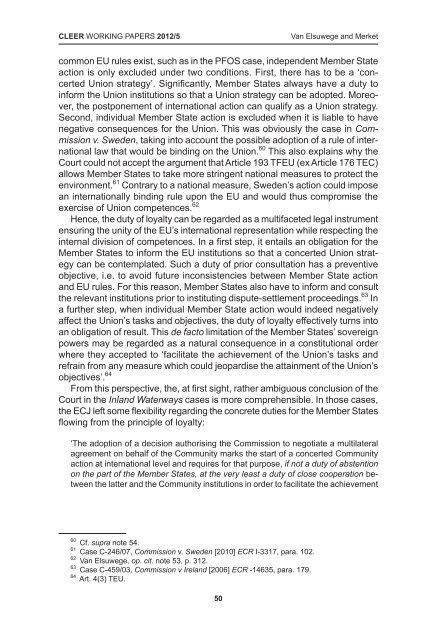Principles and practices of EU external representation - TMC Asser ...
Principles and practices of EU external representation - TMC Asser ...
Principles and practices of EU external representation - TMC Asser ...
You also want an ePaper? Increase the reach of your titles
YUMPU automatically turns print PDFs into web optimized ePapers that Google loves.
CLEER WORKING PAPERS 2012/5<br />
Van Elsuwege <strong>and</strong> Merket<br />
common <strong>EU</strong> rules exist, such as in the PFOS case, independent Member State<br />
action is only excluded under two conditions. First, there has to be a ‘concerted<br />
Union strategy’. Significantly, Member States always have a duty to<br />
inform the Union institutions so that a Union strategy can be adopted. Moreover,<br />
the postponement <strong>of</strong> international action can qualify as a Union strategy.<br />
Second, individual Member State action is excluded when it is liable to have<br />
negative consequences for the Union. This was obviously the case in Commission<br />
v. Sweden, taking into account the possible adoption <strong>of</strong> a rule <strong>of</strong> international<br />
law that would be binding on the Union. 60 This also explains why the<br />
Court could not accept the argument that Article 193 TF<strong>EU</strong> (ex Article 176 TEC)<br />
allows Member States to take more stringent national measures to protect the<br />
environment. 61 Contrary to a national measure, Sweden’s action could impose<br />
an internationally binding rule upon the <strong>EU</strong> <strong>and</strong> would thus compromise the<br />
exercise <strong>of</strong> Union competences. 62<br />
Hence, the duty <strong>of</strong> loyalty can be regarded as a multifaceted legal instrument<br />
ensuring the unity <strong>of</strong> the <strong>EU</strong>’s international <strong>representation</strong> while respecting the<br />
internal division <strong>of</strong> competences. In a first step, it entails an obligation for the<br />
Member States to inform the <strong>EU</strong> institutions so that a concerted Union strategy<br />
can be contemplated. Such a duty <strong>of</strong> prior consultation has a preventive<br />
objective, i.e. to avoid future inconsistencies between Member State action<br />
<strong>and</strong> <strong>EU</strong> rules. For this reason, Member States also have to inform <strong>and</strong> consult<br />
the relevant institutions prior to instituting dispute-settlement proceedings. 63 In<br />
a further step, when individual Member State action would indeed negatively<br />
affect the Union’s tasks <strong>and</strong> objectives, the duty <strong>of</strong> loyalty effectively turns into<br />
an obligation <strong>of</strong> result. This de facto limitation <strong>of</strong> the Member States’ sovereign<br />
powers may be regarded as a natural consequence in a constitutional order<br />
where they accepted to ‘facilitate the achievement <strong>of</strong> the Union’s tasks <strong>and</strong><br />
refrain from any measure which could jeopardise the attainment <strong>of</strong> the Union’s<br />
objectives’. 64<br />
From this perspective, the, at first sight, rather ambiguous conclusion <strong>of</strong> the<br />
Court in the Inl<strong>and</strong> Waterways cases is more comprehensible. In those cases,<br />
the ECJ left some flexibility regarding the concrete duties for the Member States<br />
flowing from the principle <strong>of</strong> loyalty:<br />
‘The adoption <strong>of</strong> a decision authorising the Commission to negotiate a multilateral<br />
agreement on behalf <strong>of</strong> the Community marks the start <strong>of</strong> a concerted Community<br />
action at international level <strong>and</strong> requires for that purpose, if not a duty <strong>of</strong> abstention<br />
on the part <strong>of</strong> the Member States, at the very least a duty <strong>of</strong> close cooperation between<br />
the latter <strong>and</strong> the Community institutions in order to facilitate the achievement<br />
60 Cf. supra note 54.<br />
61 Case C-246/07, Commission v. Sweden [2010] ECR I-3317, para. 102.<br />
62 Van Elsuwege, op. cit. note 53, p. 312.<br />
63 Case C-459/03, Commission v Irel<strong>and</strong> [2006] ECR -14635, para. 179.<br />
64 Art. 4(3) T<strong>EU</strong>.<br />
50

















